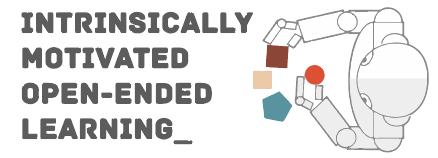 |
| Olivier Sigaud |
| speaker |
Bio
Olivier Sigaud received a Phd in Computer Science from Paris XI University (Orsay) in 1996, PhD from Paris I University in 2004. Initially working in as a research engineer in the industry (Dassault Aviation from 1995 to 2001), he pursues a career of researcher in the university in the fields of reinforcement learning and learning for robotics. He is now Professor at the Institut for Intelligent Systems and Robotics (ISIR) at Sorbonne University, Paris.
His research is focused on designing and exploiting machine learning techniques dedicated to growing motor and cognitive capabilities in robots. In practice, his work lies between machine learning, developmental robotics and computational neurosciences.
He was responsible of a group about Learning for Control and Decision in Robotics (team of four permanent researchers) at ISIR, and has been in charge of the activities about learning in the Robotics and Neuroscience group of the french working group in Robotics until 2014. He has been the principal investigator of the MACSi project (up to april 2014) based on our iCub humanoid robot. Since then, he participated to many european project, including CODYCO and DREAM, and is currenlty taking part to the PILLAR project.
Talk
Future artificial agents immersed in our society will have to learn under the guidance of their users. In ``Towards Teachable Autotelic Agents’’, some colleagues and myself have listed some of the requirements to endow these agents with the capability to be efficiently taught by humans. Among other things, we have outlined that such agents crucially need to be autotelic, i.e. they must be able to set and learn to pursue their own goals driven by some intrinsic motivations. Our survey of the literature has shown that fulfilling most of the requirements was under active investigations, apart from endowing agents with inferential social learning capabilities outlined by Gweon. In this talk, I will describe our ongoing efforts to fill this gap. First, I will show how a simple Bayesian goal inference mechanism can be leveraged to endow an artificial teacher with pedagogical teaching capabilities and an artificial learner with pragmatic interpretation capabilities. I will illustrate these capabilities with sensorimotor demonstrations, language instructions and a combination of both. Then I will show how this first teacher-learner interaction framework can be enriched by introducing in the agents the capability to model each other, endowing them with a preliminary form of theory of mind. In particular, I will highlight the pros and cons of modeling these additional capabilities with a Bayesian framework versus deep neural networks and discuss some of the related literature.
